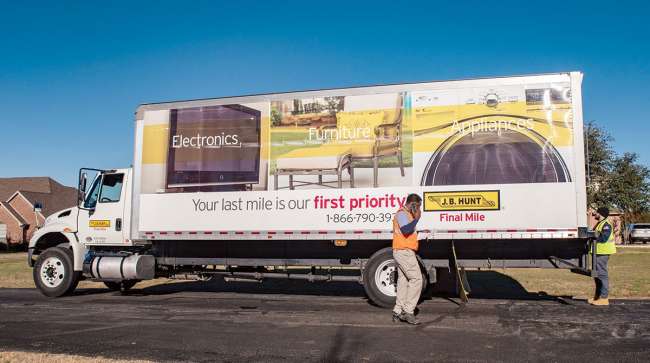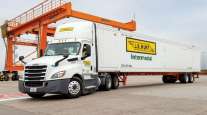Staff Reporter
J.B. Hunt Reports Mixed Results for Q1

[Stay on top of transportation news: Get TTNews in your inbox.]
Truckload carrier J.B. Hunt Transport Services Inc. reported lower first-quarter net income on increased operating revenue on April 14.
The transportation and logistics company said net income declined to $104.8 million, or 98 cents per diluted share, compared with $119.6 million, or $1.09 per diluted share, during the same year-ago period.
Total operating revenue increased 9% to $2.28 billion, compared with $2.09 billion the year before. Excluding fuel surcharges, operating revenue increased 10% from first quarter 2019.
The carrier was expected to earn $1.21 a share, according to analysts’ forecasts that also pegged revenue at $2.39 billion.
Lowell, Ark.-based J.B. Hunt said results from its truck, intermodal, dedicated contract, final-mile and other units showed a fall off in operating income to $154.7 million in the current quarter from $167.8 million a year ago.
“First-quarter 2020 operating income included a $12.3 million charge for a one-time bonus to employee drivers and certain personnel at field operations and customer facilities supporting the drivers who have kept the country’s freight moving during the COVID-19 pandemic,” the company reported.

Roberts
During an investor call, CEO John Roberts praised the commitment of his workforce amid the coronavirus pandemic.
“Let me start by thanking the J.B. Hunt teams around the country for the tireless commitment and hard work that has occurred and will continue in response to the conditions we face during this pandemic,” Roberts said. “In particular, I want to recognize the efforts and sacrifice of our driving forces and our maintenance teams.”
He added that senior management has been meeting twice daily on all macro issues related to staffing, human resources, safety and customer dynamics.
“Obviously, our commentary on this quarter and the balance of this year will be disrupted by the impact of the COVID-19 situation in many ways,” Roberts said. “We clearly cannot predict the timing or depth of the coming cycles, but by covering this data frequently, we do get a sense of direction and potential magnitude of change.”
He said the company will focus on capital deployment, margin recovery, cost-savings levers, portfolio exposure and recovery trends among other things.
“The environment is showing near-term distribution and turbulence but expect the longer term to present opportunities to capitalize on many of our existing priorities, including our efforts with 360, our final-mile and private-fleet outsourcing businesses, and both our highway services and intermodal,” Roberts said. “We’re evaluating several categories of internal and external data to better understand the scope and timing of import activities that will impact our intermodal networks.”
By sector, some of the most significant quarterly results came from intermodal, where volume increased by 7% year-over-year. Operating income was down 1% to $102 million; revenue was up 6% to $1.15 billion.

Much of the trucking industry relies on older onboard technology for critical functions, which can hurt reliability and efficiency. So is it time for fleets and their technology vendors to implement faster replacement cycles for onboard tech? Seth Clevenger talks to Ray Greer of Omnitracs and Deryk Powell of Velociti. Hear a snippet, above, and get the full program by going to RoadSigns.TTNews.com.
The trucks segment saw operating income plunge 75% to $2 million and revenue increase 3% to $105 million.
Total freight transactions in the J.B. Hunt 360 Marketplace increased to $294 million from $199 million a year ago. In this transportation management system shippers can quote, book and ship freight online, and carriers can find loads.
Dedicated Contract Services operating income surged 46% to $73 million, primarily from increased productivity of the fleet and the absence of any material implementation or weather-related costs in the current quarter. Revenue gained 10% to $542 million, primarily due to additional customer contracts and higher fleet utilization.
Final-Mile Services saw a loss of $3.3 million, primarily from increased investments to expand the network, increased costs related to temporary suspension of operations at several customer sites as a result of COVID-19, higher bad debt expense and $1.2 million in non-cash amortization expense from 2019 acquisitions. That compared with a gain of $200,000 a year ago.
Revenue was up 39% to $154 million.
J.B. Hunt Transport Services Inc. ranks No. 4 on the Transport Topics Top 100 list of the largest for-hire carriers in North America. It also ranks No. 4 on the Transport Topics Top 50 list of the largest logistics companies in North America.
Want more news? Listen to today's daily briefing:




